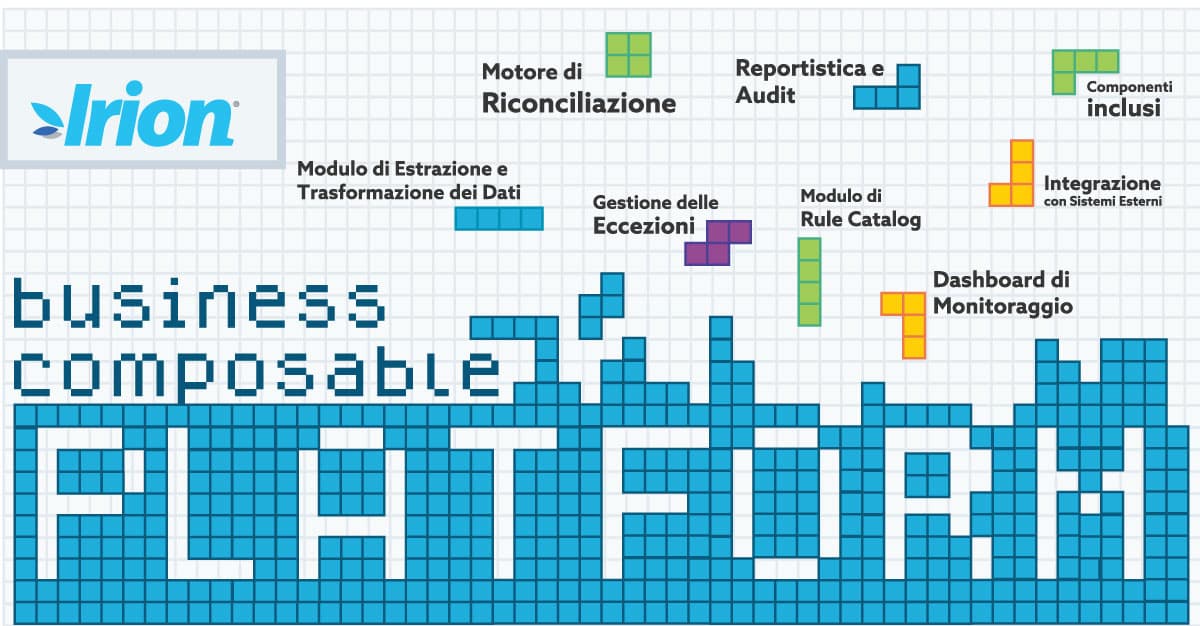Composable business architectures today represent an innovative approach to the design and management of business systems. This concept is based on creating a highly flexible business environment in which resources and services can be easily assembled and reorganized to adapt to changing business needs.
Composable platform: the orchestrator
At the heart of a composable business platform is a powerful orchestrator that enables the definition, processing, and automation of business workflows and includes an internal marketplace of tools that Data Engineers can search, select, and combine services to create new solutions. These services can include management capabilities, data analysis, quality control, master data management, and more.
Some services may be provided in-house, while others may be third-party services. A composable platform must support a wide range of APIs to enable the integration of external services and resources. It must also be able to connect to different data sources and business systems to ensure access to the necessary data and resources.
Data monitoring, security and UI
Security is a critical aspect of a composable business platform that must provide advanced authentication, authorization, and secure business data and services capabilities. The platform should provide advanced real-time monitoring and data analysis tools. These tools enable assessment of the performance of composable processes and resources, identify problems and opportunities for improvement, and make informed decisions. The platform can integrate process automation capabilities and business rules to simplify operations and ensure consistency in business operations.
A composable enterprise platform must have a tool that enables intuitive user interfaces and allows users to easily compose new solutions, monitor process progress, and access needed services and resources. The platform must be able to adapt to new and emerging technologies, such as Artificial Intelligence, Machine Learning, IoT (Internet of Things), and more, to enable companies to stay ahead of the curve.
Benefits of composable business
A composable business platform must be designed to adapt to the specific needs of the business and enable continuous growth and transformation. Its flexibility and adaptability are essential to help companies thrive in a constantly changing business environment.
Composable business enables executives to support the most significant change activities and keep track of changing user and constituent needs. Digitized business processes also face the challenge of keeping up with new business thinking. In a digital business, the physical and digital worlds are integrated so it is critical to have solutions without a “Business Requirements Gap” and resilient to architectural changes.
To address this existential challenge, organizations in all industries are turning to the fundamental design principles of composability and applying them to their business model, business operations and strategies. The following diagram (from Gartner) summarizes the differences between the traditional and composable approaches.
Example of a composable solution
Imagine a financial services company that handles transactions between different partners and needs to reconcile financial data from various sources, such as bank accounts, internal records, and partner reports.
The components of the composable business reconciliation solution can then be:
- Data Extraction and Transformation module from various sources (e.g., CSV files, databases, APIs) and transform them into a standardized format. Components included: modular data connectors, adaptable ETL (Extract, Transform, Load) processes.
- Rule Catalog module for defining composable reconciliation rules that determine how data should be compared and aligned. Components included: customizable comparison rules, reconciliation algorithms based on specific criteria.
- Composable Reconciliation Engine that performs data comparison based on defined rules and includes the following features: modular comparison, error and exception handling.
- Monitoring Dashboard: Creation of a composable dashboard that provides a real-time overview of reconciliation status. Components included: customizable dashboard, alerts to report discrepancies or problems.
- Reporting and Audit: Implementation of a composable reporting system to generate detailed reports on reconciliation activities. Components included: customizable report templates, tracking of reconciliation activities for audit purposes.
- Exception Management: Creation of a composable exception management system to quickly manage and resolve discrepancies in data.
- Integration with External Systems: Implementation of modular connectors to integrate the reconciliation solution with other business systems. Included components: modular API for integration with external systems, bidirectional data synchronization.
The benefits of a “business composable” reconciliation solution can be summarized in four points:
- Flexibility: The ability to add new data sources or reconciliation rules without restructuring the entire system
- Efficiency: Reduced development time due to the reusability of modular components
- Adaptability: The ability to customize the solution to the company’s specific needs
- Visibility: A clear view of the status of reconciliation activities through detailed dashboards and reports
This example shows how a composable business reconciliation solution could be structured to meet the needs of a financial company that handles complex transactions with multiple partners.






